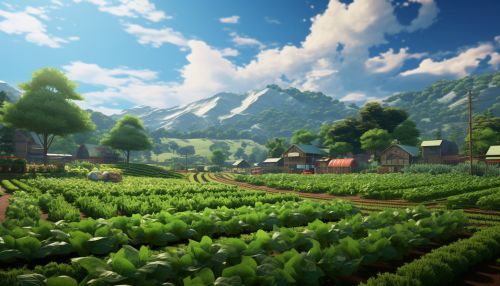Organic Farming
Overview
Organic farming is a method of crop and livestock production that involves much more than choosing not to use pesticides, fertilizers, genetically modified organisms, antibiotics, and growth hormones. This system provides a wide array of benefits to the environment, health, and animal welfare. It is a holistic system designed to optimize the productivity and fitness of diverse communities within the agro-ecosystem, including soil organisms, plants, livestock, and people.


Principles of Organic Farming
Organic farming is based on several core principles. These principles, outlined by organizations like the International Federation of Organic Agriculture Movements (IFOAM), serve as a standard for organic farmers worldwide.
Health
Organic farming is intended to sustain and enhance the health of soil, plants, animals, humans, and the planet as a whole. It sees these elements as interconnected and interdependent. Organic farmers seek to maintain this holistic system in a healthy, functioning state.
Ecology
Organic farming is based on ecological processes, biodiversity, and cycles adapted to local conditions. It uses these natural systems to create a more sustainable and resilient form of agriculture.
Fairness
Organic farming builds on relationships that ensure fairness with regard to the common environment and life opportunities. This includes fairness to the environment, to the health of consumers, and to the workers on the farm.
Care
Organic farming is managed in a precautionary and responsible manner to protect the health and well-being of current and future generations and the environment.
Techniques Used in Organic Farming
Organic farming uses a variety of techniques to enhance soil fertility, to prevent pests and diseases, and to promote biodiversity.
Crop Diversity
Crop diversity is a key aspect of organic farming. Organic farmers use techniques such as crop rotation and polyculture to ensure diversity and to interrupt cycles of pests and diseases.
Soil Management
Organic farmers enhance soil fertility primarily through the use of organic matter, such as compost, manure, and cover crops. They also use certain soil amendments, such as lime or rock phosphate, to correct nutrient imbalances.
Pest and Disease Management
Organic farmers manage pests and diseases through a combination of techniques, including crop rotation, resistant varieties, and biological pest control. They also use certain approved natural substances to control pests and diseases.
Livestock Management
Organic farmers raise livestock in a way that mimics their natural behaviors and diets. This includes access to outdoor areas, fresh air, water, sunshine, grass and pasture, and organic feed. They also use preventive measures, such as rotational grazing and a balanced diet, to help minimize disease.
Benefits of Organic Farming
Organic farming provides a wide array of benefits, both to the environment and to human health.
Environmental Benefits
Organic farming practices are designed to benefit the environment by reducing pollution and waste, enhancing soil and water quality, and promoting biodiversity. Organic farms also tend to store more carbon in the soil, helping to mitigate climate change.
Health Benefits
Organic foods are often higher in certain nutrients, including antioxidants, than conventionally grown foods. They are also lower in residues of pesticides and other potentially harmful chemicals.
Animal Welfare Benefits
Organic farming provides benefits to animal welfare, as organic standards require that animals are raised in living conditions that accommodate their natural behaviors.
Challenges and Criticisms of Organic Farming
While organic farming has many benefits, it also faces several challenges and criticisms.
Yield and Efficiency
Some studies have suggested that organic farming produces lower yields than conventional farming. However, other studies have found that the yield gap between organic and conventional farming can be reduced or even eliminated with the right management practices.
Cost and Accessibility
Organic foods are often more expensive than conventionally grown foods, which can make them less accessible to many people. However, the price of organic foods can reflect the true cost of food production, taking into account environmental and social costs that are often not factored into the price of conventional foods.
Regulation and Certification
The regulation and certification of organic products can be complex and costly, which can be a barrier for some farmers, particularly small-scale farmers in developing countries.
Future of Organic Farming
The future of organic farming looks promising, with increasing consumer demand for organic products, growing recognition of the environmental and health benefits of organic farming, and advances in organic farming techniques and technologies.
